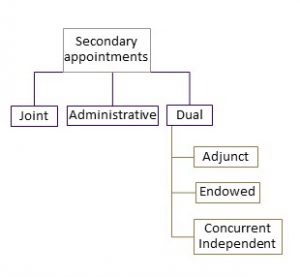Secondary appointments are academic appointments that always have a corresponding primary appointment. The three main types are joint, administrative, and dual. Within the dual category, there are three sub-types: adjunct, endowed, and concurrent independent appointments.
Joint Appointments
Joint appointments are secondary appointments whose title and rank match that of the primary appointment. Only professorial faculty may hold a corresponding joint appointment. For joint appointments that include split tenure, please review guidance on Splitting Tenure.
| Primary Appointment | Secondary Appointment | Workday Secondary Appointment Identifier |
|---|---|---|
| Professor in History | Professor in American Indian Studies | Joint |
| Research Associate Professor in Biology | Research Associate Professor in Chemistry | Joint |
| Assistant Professor WOT in Political Science | Assistant Professor WOT in Economics | Joint |
Administrative Appointments
Administrative appointments for faculty and librarians are secondary appointments that recognize administrative duties distinct from typical service related to an academic appointment. Examples include associate dean, acting chair/director, and chair/director.
| Primary Appointment | Secondary Appointment | Workday Secondary Appointment Identifier |
|---|---|---|
| Professor | Chair/Director | Administrative |
| Associate Professor | Acting Chair/Director | Administrative |
| Professor WOT | Associate Dean | Administrative |
| Librarian | Associate Dean of Libraries | Administrative |
Dual Appointments
Dual appointments are secondary appointments which do not meet the criteria of administrative or joint appointments. They may be requested by active academic personnel employees, or by academic units on their behalf. Dual appointments can only be given to academic personnel employees who already hold a primary academic appointment. The 3 types of dual appointments are adjunct, endowed, and concurrent independent.
Adjunct appointments recognize a formal relationship with another unit outside the primary appointing unit and are made only to faculty members already holding a primary appointment in another department. The title/rank of adjunct appointments are dependent upon the primary appointment. They do not confer voting privileges or eligibility for tenure in the secondary department, and their annual renewal is subject to approval by faculty in the secondary department.
Endowed appointments recognize formal endowments made to the University and often carry a monetary component and honorific title awarded to the recipient (e.g., the Acme Distinguished Professor of Chemistry). Endowed appointments are dependent upon the primary appointment. Visit the Endowments page for more details.
Concurrent independent appointments may be held by faculty (except those in Professorial Tracks), librarians, academic staff, and postdoctoral scholars. They encompass all other dual appointments in which an academic personnel employee holds two or more academic appointments which are unrelated to each other (e.g., academic personnel employee with 2 part-time lecturer appointments in 2 different academic units). Typically, concurrent independent appointments are independent of each other; that is, either appointment may be maintained if the other one is discontinued, unless otherwise prohibited by policy. When this occurs, one academic appointment must have the “primary” academic appointment identifier and the other(s) will be given a “dual” academic appointment identifier.
| Primary Appointment | Secondary Appointment | Workday Secondary Appointment Identifier |
|---|---|---|
| Professor in Education | Adjunct Professor in Social Work | Dual (adjunct) |
| Assistant Professor in Law | Endowment | Dual (endowed) |
| Senior Assistant Librarian | Lecturer Part-Time in Information Science | Dual (concurrent independent) |
